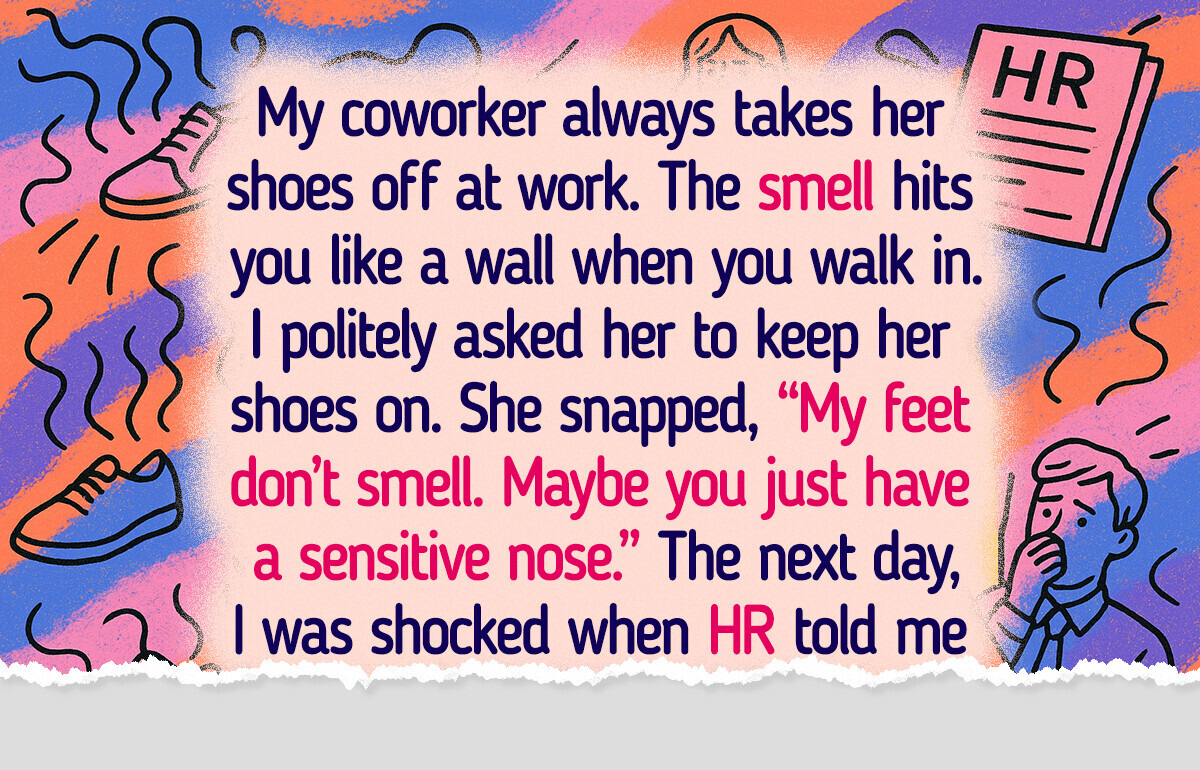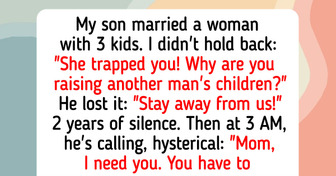15 Times Grandparents Were the Quiet Heroes Family Needed


Sometimes, small issues at work can snowball into situations you’d never expect. That’s what happened to me when I tried to address what I thought was a simple problem with my colleague. What began as a polite request quickly spiraled into an office-wide controversy, and I’m hoping you can offer some perspective.
Hi Bright Side!
I’ve been an intern at a reputable firm for a few months, focusing on making a good impression, and mostly, things were going smoothly. But then, a new coworker joined our team.
My coworker always takes her shoes off at work and prefers to be barefoot. Initially, I didn’t think much of it, but soon, the smell hits you like a wall when you walk in. It was truly unbearable. To make matters worse, we shared the same workstation, and I could sense that others sitting nearby were also uncomfortable. Yet, no one said a word.
At first, I tried dropping subtle hints. “Wow, it’s so cold in here, isn’t it? Perfect weather for cozy shoes,” I’d say, hoping she’d get the message. But she didn’t. The smell persisted, and the awkwardness in our area grew.
After a few days of silently suffering, I decided I had to address the issue directly, but I wanted to be kind about it. I approached her during a quiet moment. I politely asked her to keep her shoes on while she was working. I even added, “I know heels can be uncomfortable, but that’s why I usually wear flats in the office,” trying to be understanding.
She just looked at me with confusion and asked, “Why does it matter?”
Trying to remain diplomatic, I responded, “It just makes me uncomfortable to see bare feet at work.”
Her reply was curt: “Then don’t look.”
Taken aback, I felt I had to mention the main issue. I politely said, “It’s not just about that. There’s also a bit of an unpleasant smell, which could easily be solved if you kept your shoes on.”
That’s when things escalated. She got very defensive. Then she snapped, “My feet don’t smell. Maybe you just have a sensitive nose.” She then threatened to involve HR if I continued “harassing” her about it.
I was stunned by her reaction and decided to let it go, hoping the matter would blow over. But the story didn’t end there. The next day, I was shocked when HR told me that my colleague had lodged a formal complaint against me. My supervisor was also brought into it. Later that day, during a team huddle, my supervisor made a general announcement reminding everyone to be respectful of colleagues’ personal choices and space, which felt clearly directed at me, prompted by her complaint.
My colleague made sure others were aware she had reported me, and I felt publicly humiliated. It was strongly implied that I had overstepped. I regretted bringing it up at all.
A week later, things took another turn. I opened my email and was surprised to see a new company-wide initiative: employees could submit anonymous suggestions to improve the workplace dress code via the company platform. Most ideas were straightforward, like relaxing the tie requirement or allowing casual Fridays.
However, one suggestion stood out—it proposed banning barefoot behavior in the office. To my surprise, it gained an overwhelming number of likes and comments in support. My colleague, absolutely convinced that I had submitted the suggestion, confronted me angrily. “Why are you trying to humiliate me?” she demanded.
I assured her I had nothing to do with it, but she didn’t believe me. The situation became so uncomfortable that she avoided me entirely. The irony? The anonymous suggestion’s popularity seemed to embarrass her far more than my initial quiet request ever did. By the following week, she started wearing flats to work, without waiting for any official policy change.
So, even though my colleague is now wearing shoes to work and the “stench” has subsided, there is now major awkwardness between us. It feels like several others from my team are also a bit uncomfortable around me now. Did I do something wrong by voicing my opinion? Should I apologize to try and clear the air? I’m really in a bind and don’t know how to fix the atmosphere. Any advice would be greatly appreciated."
Thank you for sharing your story with us. It certainly sounds like a tricky and stressful environment to navigate. Here are some suggestions from the Bright Side team on how you might move forward and handle similar situations professionally in the future.
By thoughtfully considering these approaches, you can navigate workplace concerns more effectively, aiming for respectful resolutions and minimizing the potential for conflict.
If you’re considering switching jobs, here are 8 skills bosses are actively looking for, that have nothing to do with technology.











